You may have heard some of these 10 common pregnancy food myths even before you became pregnant or maybe you just recently learned some of them since you’ve been Googling all things pregnancy. Nutrition and dietetics can be confusing and intimidating during pregnancy, but I’m here to help guide you with scientific evidence!
The truth is, there is a lot of misinformation out there related to prenatal nutrition for expecting mothers. Rest assured, you can always count on us to provide evidence-based guidance and bust the pregnancy myths about nutrition during pregnancy. So let’s dive into the common myths for a pregnant woman!
10 Common Pregnancy Food Myths
1. You need to eat for two.
It is a common misconception that when you are pregnant you are eating for both you and your baby. While yes, technically, you are eating to not only fuel you but to grow your baby, but this does not mean you add an extra 1600-1800 calories to your daily diet. Instead, focus on a balanced diet with important nutrients to fuel your body.
It is also true your nutrient needs increase, but they do not double.
During the last few months of pregnancy, it is suggested to increase your calories by 350-500 calories a day in the second and third trimesters. This may be appropriate for some women, but not for every one (1). For example, some days you may eat an extra 340 calories per day, and some days you may eat 550 extra calories.
Nutrition should be catered to the individual and does not need to follow a cookie-cutter plan.
A gradual increase in calories is best for you and your developing baby and eating from each food group. I urge women to eat until you are satisfied and you should be right around where you need to be calorie-wise.
You can add calories in a number of healthy ways. To make each meal as nutritious as possible while increasing calories add extra veggies, switch to full-fat dairy, and top foods with avocado.
We prefer to use the term “nourishment for two” rather than “eating for two” during pregnancy. Eating a healthy diet can help with many symptoms including headaches, constipation, weight gain, morning sickness, and blood pressure.
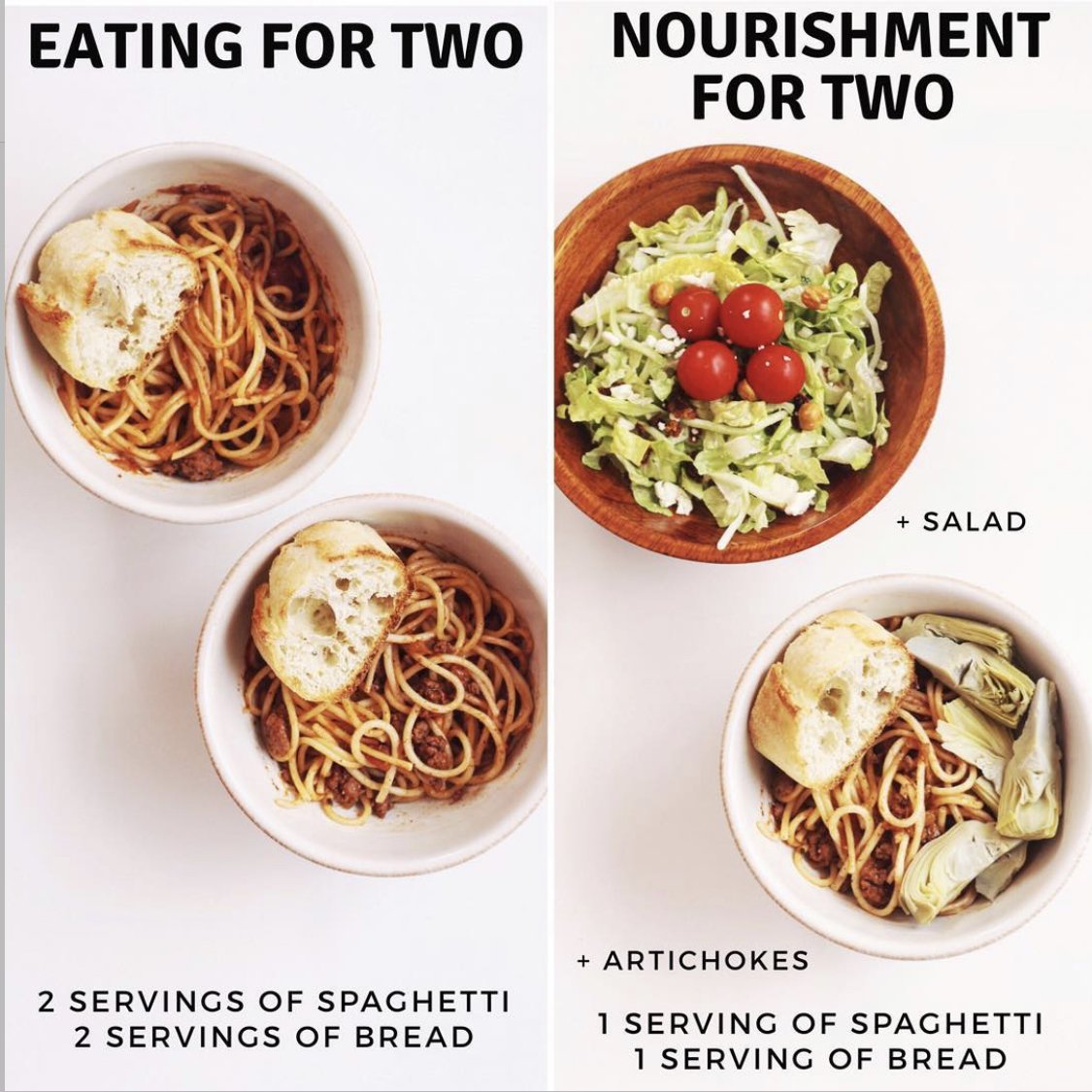
2. If you eat something during your pregnancy, your baby will like it.
While I can’t promise that eating Brussel sprouts while you are pregnant will ensure that your baby will like them as they grow older, it definitely won’t hurt.
Certain foods that are uncommon to enjoy does not mean that your baby will automatically like them. Babies take the nutrients from what we put into our bodies and utilize them. No undigested food is going to the baby.
Most of what we taste comes from our sense of smell. Since the baby is surrounded in amniotic fluid, their sense of smell is hindered while they are in utero.
The development of taste preferences is a highly complex topic that is beyond the scope of this article.
Around 30 weeks of gestation, the baby’s taste buds are activated and what you eat the baby does begin to taste (2). Similar to once the baby is born, what you eat affects how your breastmilk tastes.
Eating a wide variety of foods, such as fruits and vegetables, and keeping your diet balanced will keep you healthy throughout your pregnancy.
3. Eating spicy food during pregnancy will cause you to go into labor.
It is common that people think eating spicy foods will cause you to go into labor. Or that pineapple causes contractions. This is absolutely not the case.
Spicy foods are known to cause indigestion and heartburn making you feel even more uncomfortable, but will not cause you to go into labor during any time in your pregnancy.
In some cases, spicy food may cause other gastrointestinal issues, if this is the case, simply avoid them.
Of course, there is always the chance for coincidence and you might happen to be eating spicy foods just around the time your body is ready to go into labor.
While it is an old wives tale to try spicy foods if you are past your due date, it is not harmful to you or the baby if you do decide to enjoy foods that are spicy or snack on pineapple every now and then.
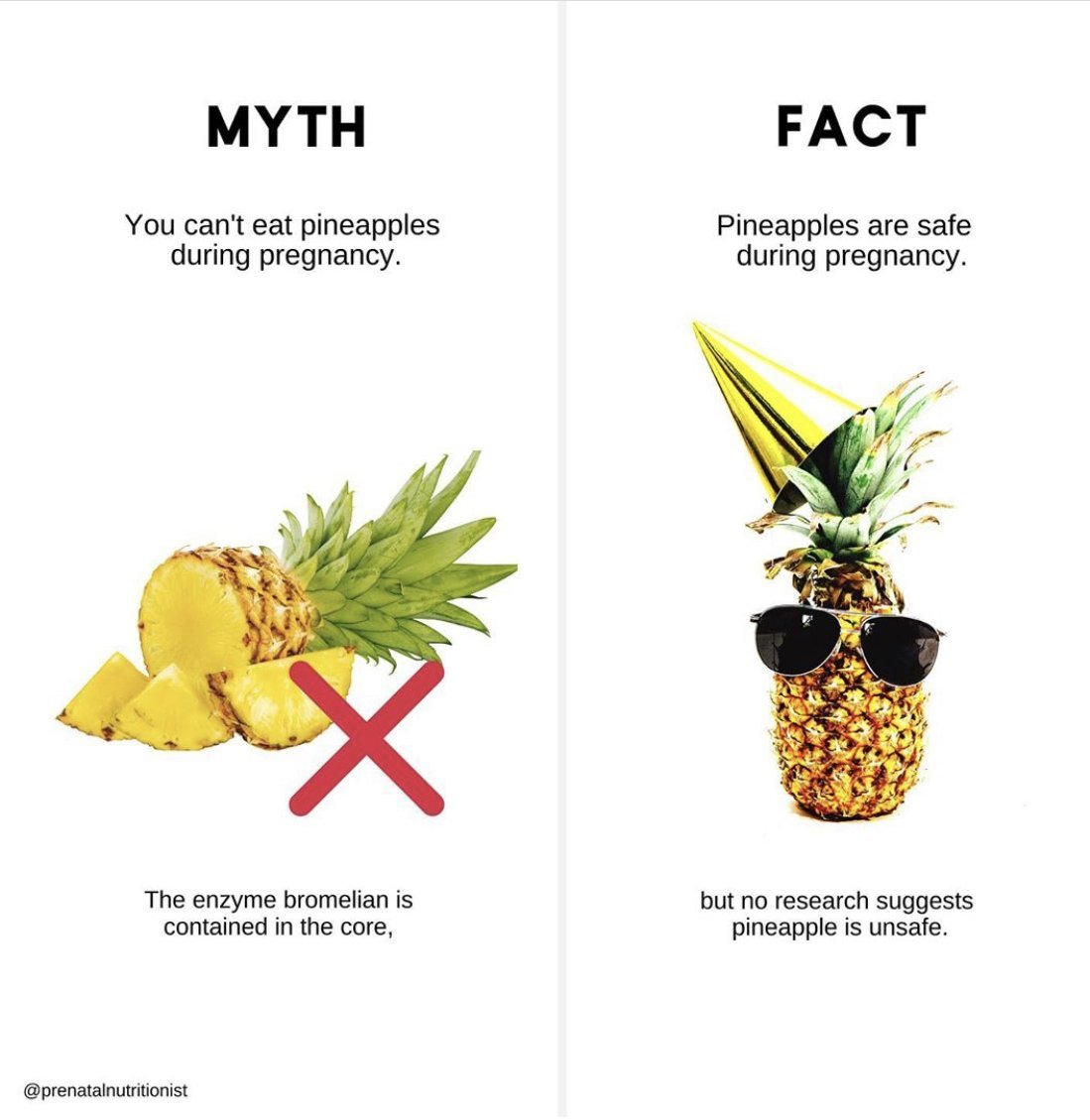
4. You cannot have caffeine during pregnancy.
It is okay to have caffeine during pregnancy. It is commonly thought that you must give up coffee while pregnant. Rest assured you can still have your daily cup (maybe even two) and coffee doesn’t need to be avoided during pregnancy.
Since coffee and tea are popular morning beverages, there is a growing body of evidence on the effects of caffeine during pregnancy.
It is recommended to limit your caffeine intake to 200-300 mg (4, 5). While some studies don’t suggest adverse effects until closer to 6 cups per day (6).
Keep in mind, more foods than coffee contains caffeine. Foods like tea, chocolate, and soda also contain caffeine and should be added to your total caffeine consumption for the day.
Some women are averse to coffee once they become pregnant, but others still need it to keep them moving through their day.
Do what is best for you and your baby.
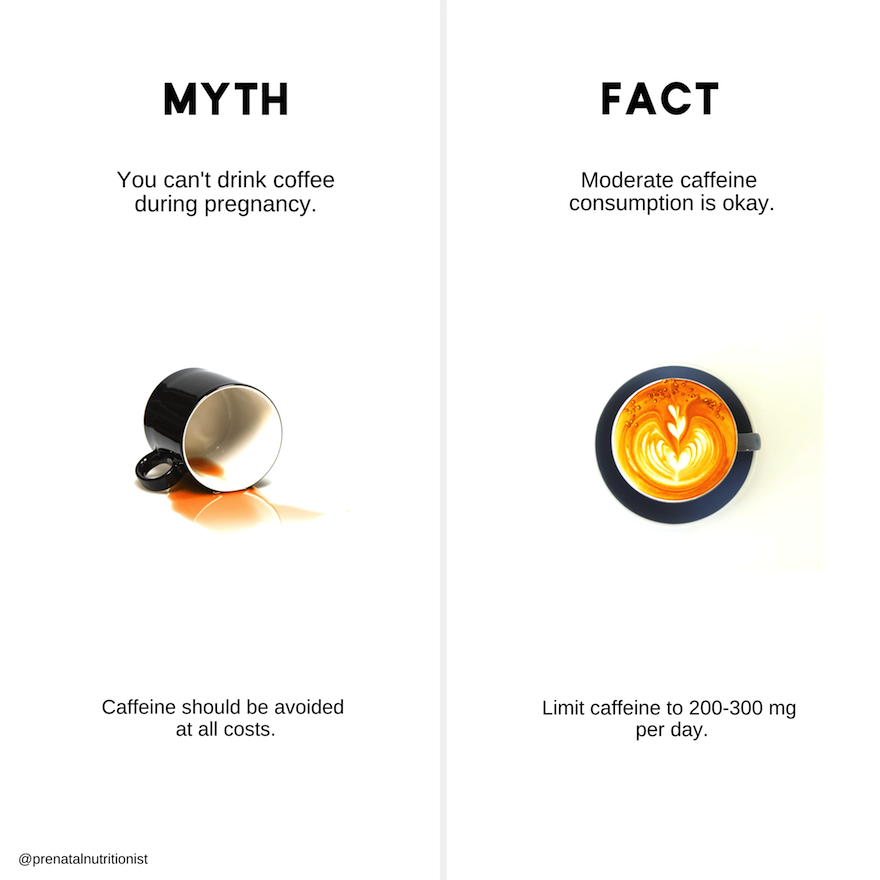
5. Avoid or limit your fish intake.
Fish is a great source of protein, healthy fats, and several important vitamins and minerals for pregnancy. Unless you are allergic, it should not be avoided.
There are two reasons why fish finds its way on many of the foods to avoid while pregnant lists. One reason is fish may be more likely to cause food-borne illness.
Cooking fish and shellfish until it reaches 145 F greatly reduces the chance of you contracting a food-borne illness from it.
The second reason is the mercury contained in fish.
While it is true we want to avoid the highest mercury fish such as shark, swordfish, tilefish, and king mackerel, it is not true that we need to limit our intake of all fish to 12 oz. per week. Some types of tuna such as bigeye and ahi should be limited to 6 oz. per week.
One study compared the pregnancy outcomes of women who ate fish during their pregnancy to those who did not consume any fish. The study found that those who ate fish did have higher mercury levels, but also had better pregnancy outcomes (5).
There are many types of fish that are great for pregnancy and high in omega-3 fatty acids, such as salmon, shrimp, sardines, or trout to name just a few. You do not need to avoid fish to have a healthy pregnancy.
6. You can’t eat soft cheeses while pregnant.
If you shop at popular grocery stores in the US, the soft cheeses are pasteurized.
It’s very easy and quick to turn the cheese package over and find the word “pasteurized.”
Now, if you eat from a farm or strictly shop at farmer’s markets you might have to do some extra investigating. Don’t be shy to ask your farmers or market employee’s about dairy products before purchasing.
Pasteurization is a heat treating process that helps destroy pathogens contained in foods (6).
Keep in mind, pasteurization still does not guarantee the product completely free of harmful bacteria it just decreases the chances.
Use your intuition which is much better than you think. If the cheese looks or smells funky (more funky than normal cheese smell) then don’t eat it.
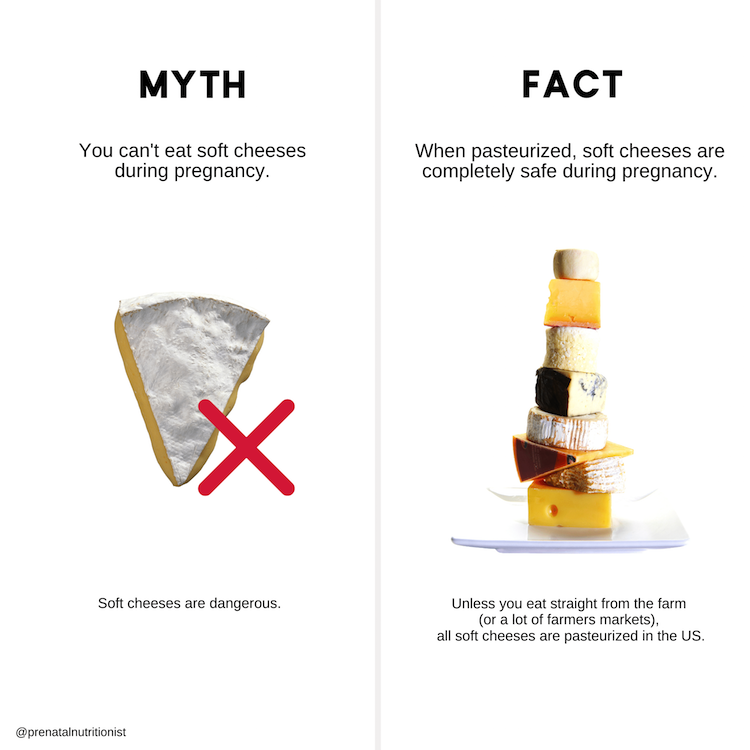
7. You can’t eat deli meat while pregnant.
Can you eat deli meat while pregnant? Let’s look at the facts!
Nearly all types of food can carry listeria, not just deli meats.
According to the CDC, pregnant women are 10 times more likely to get sick from listeria (7).
However, listeriosis is still an extremely rare disease; according to the CDC, an estimated 1600 people get sick per year in the US, but statistics are similar in Europe [that’s a super low number!] (7).
Stats also show deli meats were more likely to be contaminated in the 90s’, now more dairy items and produce are contaminated.
Heating deli meats to 165 F greatly reduces the chances of listeria growth in your meat. Remember, deli meat is not raw meat.
Pasteurization (a heat-treating process) as mentioned in the previous myth or fact post on soft cheeses greatly reduces the chance of bacteria growth!
This is not to downplay the seriousness of listeriosis in pregnancy at all!
If you do experience flu-like symptoms such as fever and diarrhea, contact your provider.
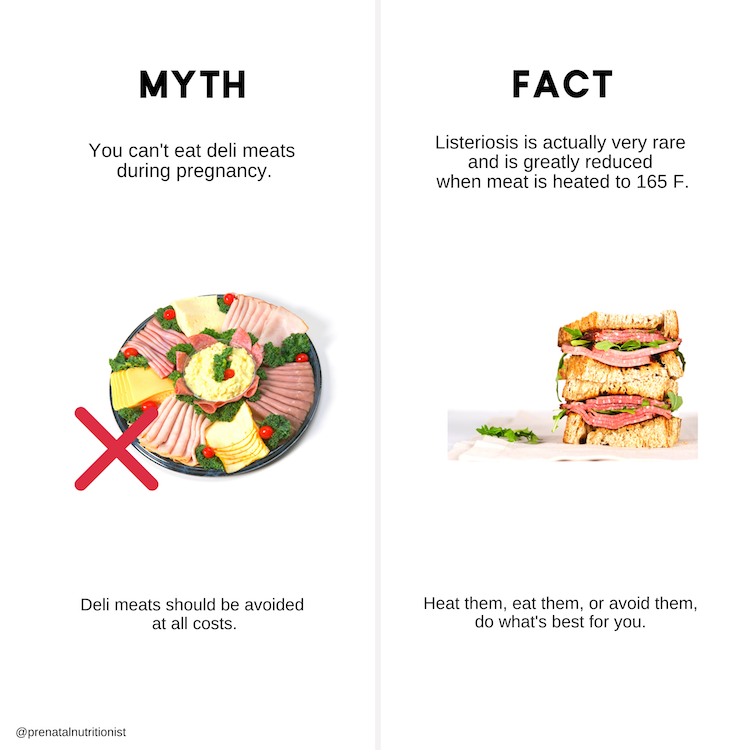
8. A prenatal vitamin replaces a healthy diet
Prenatal vitamins do not have everything necessary to have a healthy pregnancy. They can help supplement the diet, but it is essential to eat a well-balanced diet prior to and during pregnancy.
A food-first nutrition approach means, ideally, your nutrient needs will be met through food. Although pregnancy is a time when your nutrient needs are high and it is challenging to meet your needs through the foods you eat alone.
It is very hard to make a blanket recommendation when it comes to taking prenatal vitamins because everyone is starting at a different place nutritionally, follows various diets, and may eliminate certain foods or entire food groups. Check out The Prenatal Nutrition Library for a full guide to prenatal vitamins including recommendations in helpful categories.
9. You have to avoid honey during pregnancy
Honey is considered a raw food item, and according to the CDC, it may contain bacteria (Clostridium botulinum spores) that can lead to botulism in infants.
Botulism is a paralytic disease caused by neurotoxins produced by Clostridium botulinum bacterium spores.It can be dangerous if these spores find their way to the baby’s digestive system, as infants and babies under one year of age do not yet have the well-developed immune systems needed to fend off this bacterium.
But what about in utero?
In short, no! Adult immune systems and gut flora are significantly more developed and able to neutralize harmful toxins, such as Clostridium botulinum, making it highly unlikely that botulism will develop in adults.
10. Pineapple
Pineapple is thought by many to be unsafe to consume during pregnancy due to the risk of bromelain, leading to uterine contractions or miscarriage. It is even used in some cultures to induce contractions or labor. However, research does not support this as an effective usage of pineapple.
Pineapple is safe for pregnancy and contains many benefits like antioxidants, vitamin C, and is a hydrating fruit while pregnant.
There you have it, a list of 10 common pregnancy food myths! Hopefully we have provided some clarity around certain misconceptions for pregnancy. To gain even more confidence during pregnancy, join us inside The Prenatal Nutrition Library.
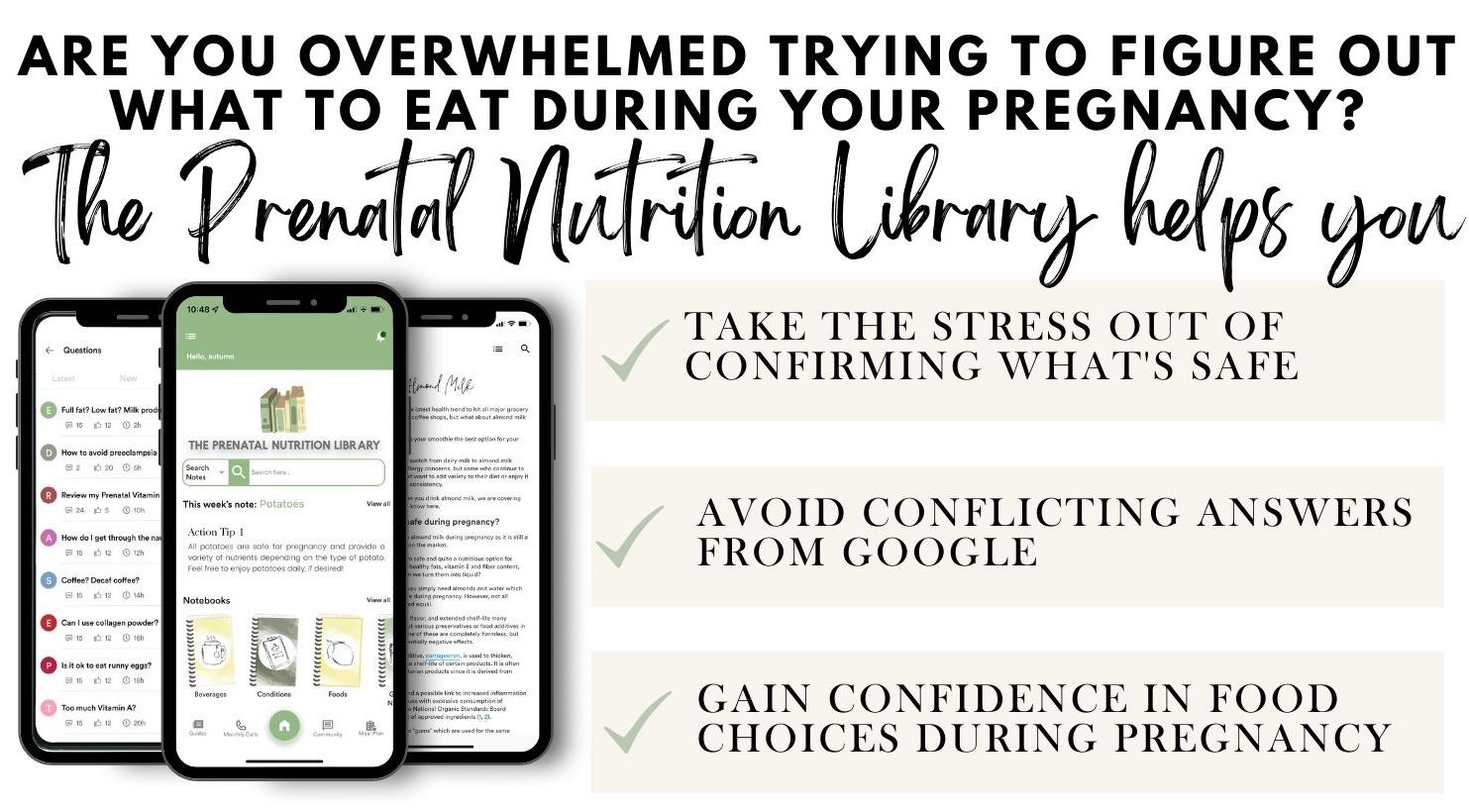
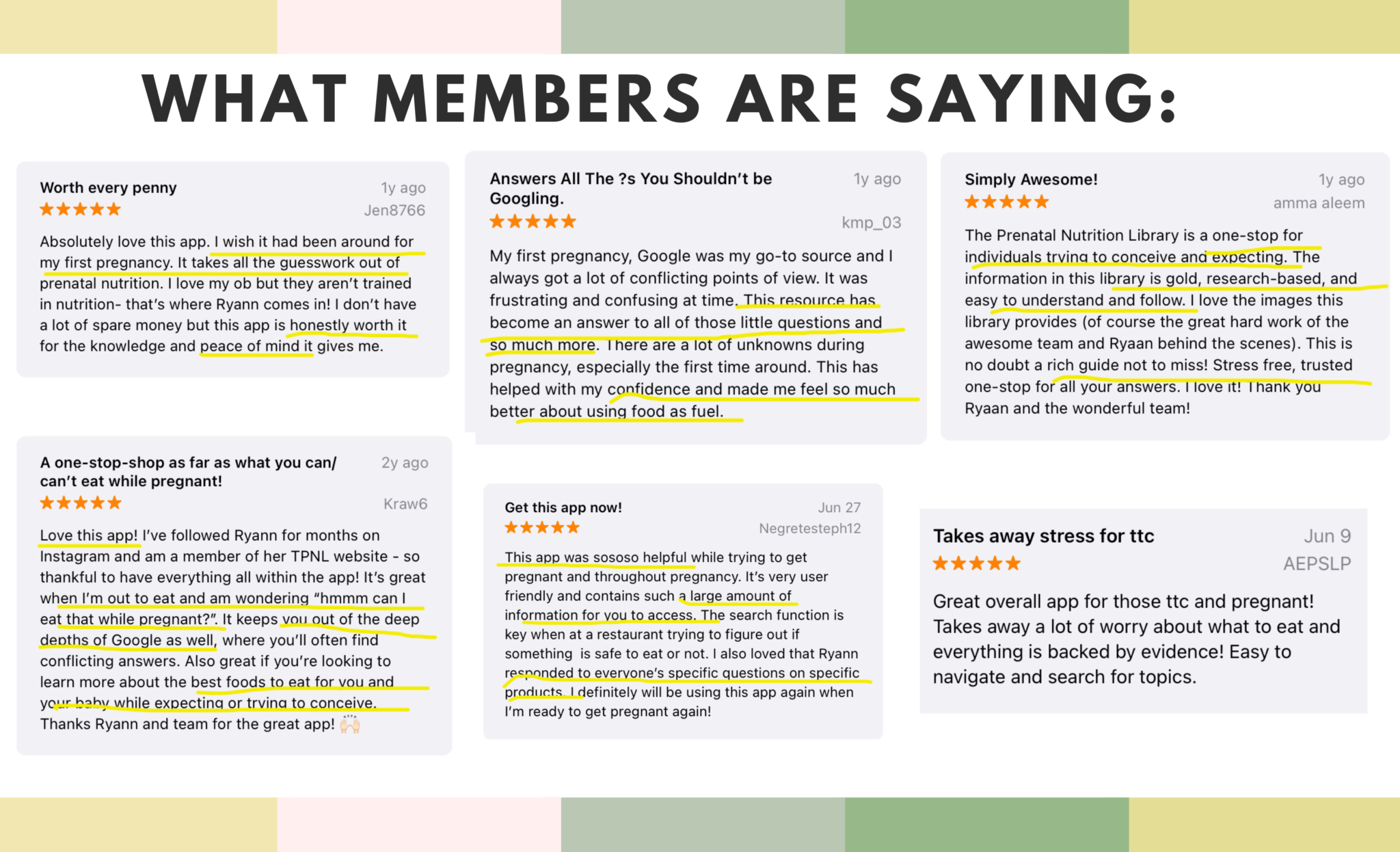
By Lauren Gannon, Dietetic Intern and Ryann Kipping, MPH, RDN | Owner & Founder










